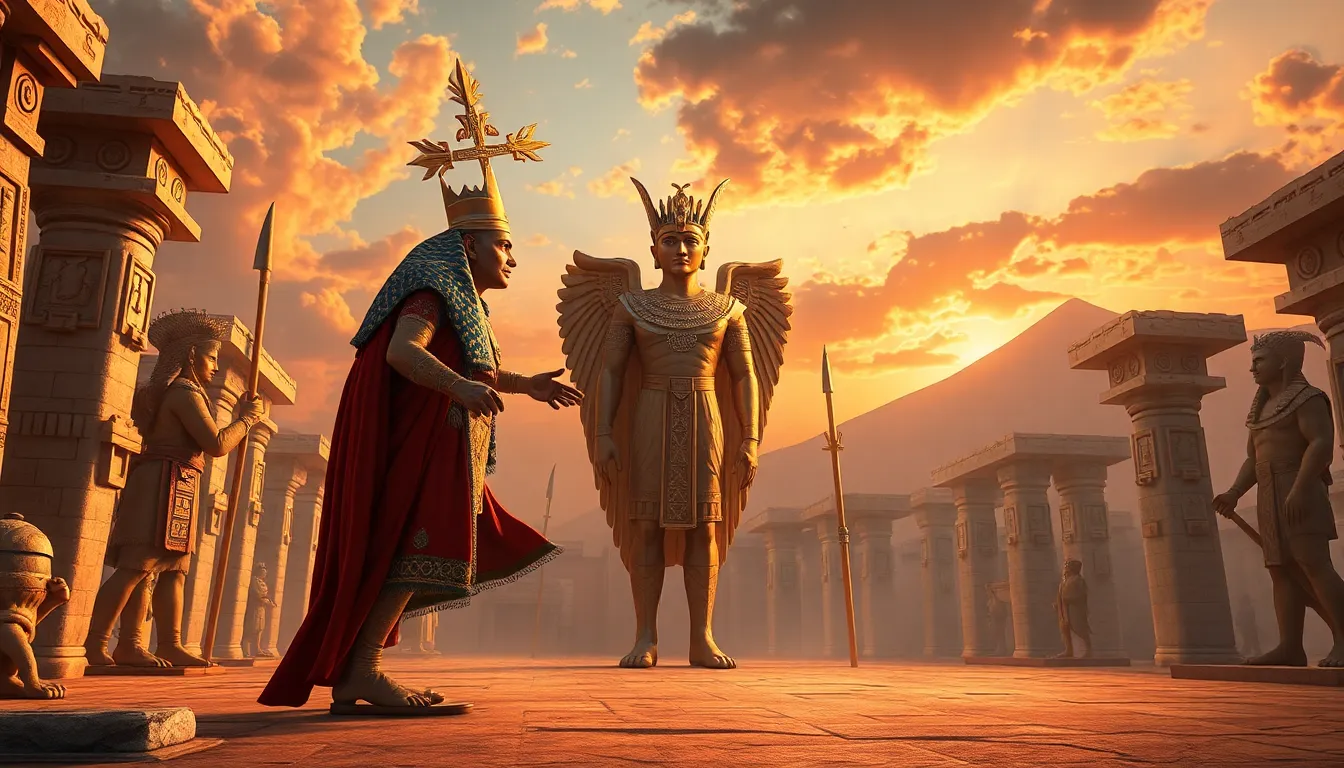The Role of Divine Kingship in Egyptian Diplomacy
I. Introduction
Divine kingship in ancient Egypt refers to the belief that the pharaoh was not just a political leader but also a divine figure ordained by the gods. This concept imbued the pharaoh with immense authority and responsibility, linking the ruler’s legitimacy to the favor of the divine. Diplomacy, on the other hand, was crucial in ancient Egyptian society for maintaining relationships with neighboring states, managing trade routes, and ensuring peace.
This article explores the intersection of divine kingship and diplomacy, examining how the pharaoh’s perceived divinity influenced diplomatic practices and relationships throughout ancient Egyptian history.
II. Historical Context of Divine Kingship
The origins of divine kingship in ancient Egypt can be traced back to the early dynastic period, where rulers were believed to be the earthly embodiment of deities. This belief system provided a framework for governance and societal structure, positioning the pharaoh as both a political and spiritual leader.
Key pharaohs who exemplified divine kingship include:
- Narmer – Often credited with unifying Egypt, Narmer was seen as a divine figure who established the first dynasty.
- Hatshepsut – As one of the few female pharaohs, Hatshepsut effectively used divine kingship to legitimize her rule.
- Ramses II – Known as Ramses the Great, his reign exemplified the use of divine authority in diplomacy and military endeavors.
The theological underpinnings of kingship and statecraft were deeply rooted in the belief that the pharaoh was a mediator between gods and humans. This role was essential for maintaining order and ensuring the prosperity of the land.
III. The Diplomatic Functions of the Pharaoh
The pharaoh served as a crucial mediator between the divine and the mortal realms. This role was not merely symbolic; it had practical implications for diplomacy. The pharaoh’s responsibilities included:
- Maintaining ma’at, the ancient Egyptian concept of cosmic order, which was essential for social stability and peace.
- Engaging in diplomatic negotiations that reflected the will of both the gods and the people.
- Symbolically representing the unity and strength of the nation in foreign relations.
Through rituals and ceremonies, the pharaoh reinforced his authority, showcasing his divine right to rule and negotiate on behalf of the people.
IV. Divine Kingship and Foreign Relations
The diplomatic landscape of ancient Egypt was marked by interactions with neighboring states and tribes. Key aspects of this interaction included:
- Marriage Alliances: Marriages between pharaohs and foreign princesses were a common strategy to secure peace and strengthen ties with neighboring nations.
- Treaties and Agreements: Treaties, such as the famous peace treaty between Ramses II and the Hittites, were often framed as reflections of the pharaoh’s divine authority, emphasizing the legitimacy of the agreements.
These diplomatic maneuvers were seen not just as political strategies but as acts that mirrored divine will and intervention.
V. Religious Rituals and Diplomatic Events
Religious rituals played a significant role in diplomatic events. These ceremonies showcased divine kingship and were integral to the diplomatic process. Key elements included:
- Ceremonies: State visits often included rituals to honor the gods, reinforcing the pharaoh’s divine right to negotiate.
- The Role of Temples: Temples acted as centers of diplomacy, where priests mediated between the pharaoh, the gods, and foreign dignitaries.
- Divine Imagery: Diplomatic gifts often included symbols of divine favor, emphasizing the pharaoh’s role as a god on earth.
These practices underscored the belief that successful diplomacy was contingent upon divine approval and intervention.
VI. Case Studies in Egyptian Diplomacy
Several significant historical records provide insights into the role of divine kingship in Egyptian diplomacy, particularly the Amarna Letters. This collection of correspondence between Pharaoh Akhenaten and various foreign leaders reveals:
- How diplomatic language often invoked divine favor, showcasing the intertwining of religion and politics.
- Notable treaties, such as the one with the Hittites, which not only resolved conflicts but also reinforced the idea of the pharaoh’s divine authority.
- The impact of divine kingship on specific diplomatic outcomes, illustrating that the pharaoh’s perceived divinity could sway negotiations.
VII. The Legacy of Divine Kingship in Modern Understanding
The concept of divine kingship has left a lasting legacy on perceptions of leadership in Egypt and beyond. Its influence extends to contemporary theories of governance and diplomacy in several ways:
- Modern leaders often draw upon the symbolism of divine authority to legitimize their power.
- The dynamics of divine kingship can be seen in various political structures where leaders are viewed as having a mandate from a higher power.
- Archaeological findings and historical texts continue to provide insights into these ancient practices, enriching our understanding of their implications.
VIII. Conclusion
In summary, divine kingship played a pivotal role in the diplomatic practices of ancient Egypt, intertwining religious beliefs with political actions. The pharaoh’s authority was seen not only as a political necessity but as a divine mandate that shaped interactions with foreign powers.
The importance of divine kingship in the broader context of ancient diplomacy cannot be understated, as it influenced both the conduct of foreign relations and the stability of the state. These concepts have left a profound impact on future generations, informing how leadership and power are perceived in various cultures today.




